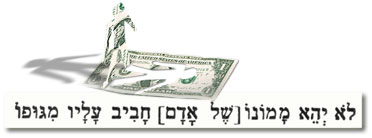
In a village
near Jerusalem there lived a rich Jew and his wife. Once a Gentile came to
their home to borrow money. The woman went upstairs and opened the chest where
they kept their gold. But when she reached in to take some coins, a voice
called out, "Do not touch it! It is not yours!"
Frightened,
the woman went downstairs and told her husband what had happened. He went
up and opened the chest. The voice again called out, "Do not touch it!
It is not yours!"
 A
man should not care more about his money than his body.
A
man should not care more about his money than his body.
(BT BK 117b)
|
The man asked,
"To whom does it belong?"
"To
Abraham the Carpenter," answered the voice.
Saddened by this
discovery, the man took the money from the chest, cut a hole in a tree in
his garden, and hid the money there. Then he and his wife went out into the
streets to beg. Soon
after this, there was a great flood that carried away many houses and trees,
including the tree with the money hidden inside it. A fisherman found the
tree floating in the river and said, "What a good piece of timber this
is! I am sure that my friend Abraham the Carpenter would be happy to have
it." So he brought the tree to Jerusalem where Abraham lived.
When Abraham
began hewing the tree to make a table, he found the treasure inside it. He
was overjoyed at his sudden good fortune and thanked God with all his heart.
 Not
long after this, the couple to whom the treasure had once belonged decided
to travel to Jerusalem to see whether the money had found its way to its true
owner. They came to Abraham's house and knocked on the door. It was Friday
afternoon, and Abraham's wife was preparing the Sabbath.
Not
long after this, the couple to whom the treasure had once belonged decided
to travel to Jerusalem to see whether the money had found its way to its true
owner. They came to Abraham's house and knocked on the door. It was Friday
afternoon, and Abraham's wife was preparing the Sabbath.
When she
saw the poor old couple at the door, dressed in tatters and begging for bread,
she invited them in to spend the Sabbath.
But when
the two beggars saw their own silver cups on the table, they began to weep.
"Why are you
weeping?" asked Abraham's wife.
At first
they refused to tell her. But she pressed them until they told her the story
of the mysterious voice that had made them surrender their treasure to its
true owner. Then Abraham's wife told them how her husband had found their
treasure in the uprooted tree.
"Please
take back what is yours," she told them. "We have enough without
taking your things."
"No,
they are yours," replied the poor couple. "We must have sinned,
and so have lost everything."
When Abraham's
wife told him about the poor couple's misfortune, he instructed his cook to
bake a cake and hide 100 silver coins inside. This cake he gave to the old
couple on Sunday morning, although they were reluctant to take anything from
him.
On their
way home they came to a place where they had to pay a toll. Since they had
no money, they gave the tollkeeper the cake that Abraham the Carpenter had
given them.
"How
fortunate!" thought the tollkeeper, "Now I have a beautiful gift
to give Abraham the Carpenter in honor of his son's wedding."
So he gave
the cake to Abraham. And thus the treasure returned to its rightful owner.
The old couple
died in poverty, for they had never given charity and God punished them by
taking away their wealth. As for Abraham and his wife, whose hands were always
open to the poor, they lived happily to a ripe old age and they never lacked
for bread.
|
 Frankel,
Ellen. The Classic Tales: 4,000 Years of Jewish Lore. Copyright
© 1989, 1993 by the author (Northvale, New Jersey: Jason Aronson),
pp. 380-81. Reprinted by permission of the publisher, Jason Aronson Inc.,
Northvale, NJ Copyright © 1989. Frankel,
Ellen. The Classic Tales: 4,000 Years of Jewish Lore. Copyright
© 1989, 1993 by the author (Northvale, New Jersey: Jason Aronson),
pp. 380-81. Reprinted by permission of the publisher, Jason Aronson Inc.,
Northvale, NJ Copyright © 1989. |
|
Moses
Gaster. The Maaseh Book: Book of Jewish Tales and Legends (Philadelphia:
Jewish Publication Society, 1981). |
MONEY
Table of Contents